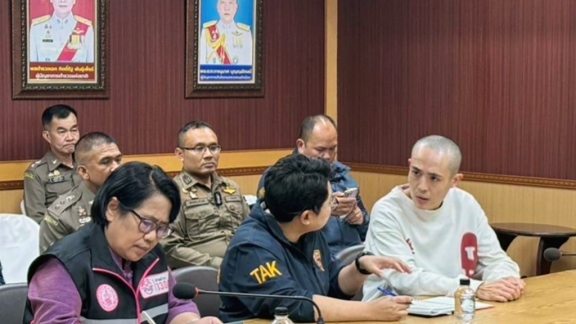
The Chinese Embassy in Thailand issued a warning on Saturday, urging Chinese citizens visiting the country to be cautious of “high-paying job recruitment” scams. Travelers were advised not to trust false promises such as “high-paying jobs,” “free tickets,” and “free food and accommodation” to avoid being deceived.
On Friday, the embassy confirmed that a Chinese citizen, surnamed Wang, had safely returned to China from Thailand following coordinated efforts between both nations. The embassy expressed its gratitude to the Thai government for prioritizing Wang’s case, which stemmed from cyber fraud, and for swiftly executing a rescue operation.
Wang Xing, a Chinese actor, arrived in Thailand on January 3 but lost contact near the Thailand-Myanmar border. Thai authorities tracked his movements and successfully rescued him on Tuesday, identifying him as a victim of human trafficking. The incident has sparked widespread concern in both China and Thailand.
Details of Wang’s Case and Rescue Operation
Thailand’s Senior Inspector General, Thatchai Pitaneelaboot, provided insights into Wang’s rescue in an interview on Thursday.
Investigations revealed that Wang had received a job offer and traveled to Thailand. Upon arrival at Suvarnabhumi Airport in Bangkok on January 3, 2025, a vehicle arranged by his “recruiter” picked him up. Wang, sensing potential danger, took photos of the vehicle’s license plate and key landmarks along the way, sending them to his girlfriend in China. However, he only realized he had been deceived when he was taken across a river into a remote area of Myanmar, devoid of recreational facilities.
According to the Tak Immigration Office, Wang entered Thailand at approximately 3:16 a.m. local time on January 3. He left Suvarnabhumi Airport by car at 3:40 a.m., passing through Chainat and Kamphaeng Phet provinces before losing contact at around 11:00 a.m. in Mae Sot, Tak province. Authorities later confirmed that he had been transferred to another vehicle in Mae Sot, with no evidence of him crossing through an official border checkpoint into Myanmar.
Authorities used various tracking technologies to locate Wang. “Since he traveled directly from Suvarnabhumi Airport to the border without stopovers, we were able to pinpoint his crossing location and identify the driver, which provided us with more accurate information,” Thatchai explained.
Warnings and Preventative Measures
Regarding potential future cases, Thatchai assured that Thai police would assist within legal frameworks but noted that more complex cases—such as those involving multiple vehicle transfers or personnel changes—posed significant tracking challenges.
He urged Chinese visitors to remain cautious of job offers in neighboring countries, particularly if they involve transit through Thailand. He also emphasized the importance of educating travelers about the dangers of human trafficking and the risks associated with fraudulent job offers.
The Thai authorities will continue prioritizing cross-border cooperation and preventative measures, including raising awareness about scams that lure individuals into human trafficking networks.
Embassy Advisory for Chinese Citizens
Chinese citizens in Thailand who experience threats to their personal safety or legal rights should immediately report incidents to the police. They may also seek assistance from friends, family, or others in Thailand to report on their behalf and contact the Chinese Embassy or consulates for support.
The embassy also reminded travelers of the China-Thailand mutual visa exemption agreement, which stipulates that activities such as working or studying require prior approval and an appropriate visa before entry. Visitors entering under the visa exemption policy must refrain from engaging in unauthorized employment or activities that violate the agreement’s terms.






